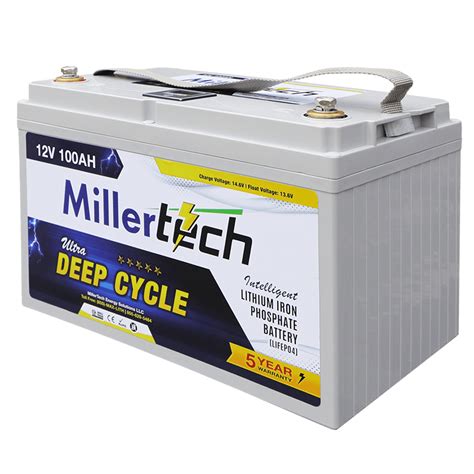The world is shifting towards a more sustainable and environmentally friendly future, and one of the key drivers of this change is the increasing demand for lithium batteries. As a leading player in the industry, Miller Tech Lithium Batteries is at the forefront of this revolution, providing innovative and high-quality solutions that are powering the future.
With the rise of electric vehicles, renewable energy systems, and portable electronics, the demand for lithium batteries has never been higher. However, the production of these batteries poses significant environmental and social challenges, from the sourcing of raw materials to the disposal of waste products. Miller Tech Lithium Batteries is committed to addressing these challenges head-on, investing in research and development to create more sustainable and responsible manufacturing processes.
What Are Lithium Batteries?
Lithium batteries are a type of rechargeable battery that uses lithium ions to store energy. They are widely used in portable electronics, electric vehicles, and renewable energy systems due to their high energy density, long cycle life, and relatively low self-discharge rate. Lithium batteries work by moving lithium ions between two electrodes, a positive cathode and a negative anode, through an electrolyte solution. This process allows the battery to store and release energy as needed.
Types of Lithium Batteries
There are several types of lithium batteries, each with its own unique characteristics and applications. Some of the most common types of lithium batteries include:
- Lithium-ion (Li-ion) batteries: These are the most widely used type of lithium battery and are known for their high energy density and long cycle life.
- Lithium-polymer (Li-poly) batteries: These batteries use a polymer electrolyte instead of a liquid electrolyte and are known for their flexibility and safety features.
- Lithium-iron-phosphate (LiFePO4) batteries: These batteries use a lithium-iron-phosphate cathode and are known for their safety, reliability, and long cycle life.

Benefits of Lithium Batteries
Lithium batteries offer a number of benefits over traditional battery technologies, including:
- High energy density: Lithium batteries have a high energy density, which means they can store a lot of energy relative to their size and weight.
- Long cycle life: Lithium batteries can be charged and discharged many times without losing their capacity, making them a reliable choice for long-term applications.
- Low self-discharge rate: Lithium batteries have a relatively low self-discharge rate, which means they can retain their charge for long periods of time without being used.
- Flexibility: Lithium batteries come in a range of shapes and sizes, making them suitable for a wide range of applications.
Applications of Lithium Batteries
Lithium batteries are used in a wide range of applications, including:
- Electric vehicles: Lithium batteries are used to power electric vehicles, providing a reliable and efficient source of energy.
- Renewable energy systems: Lithium batteries are used to store energy generated by renewable energy systems, such as solar and wind power.
- Portable electronics: Lithium batteries are used to power portable electronics, such as smartphones, laptops, and tablets.

Challenges Facing the Lithium Battery Industry
Despite the many benefits of lithium batteries, the industry faces several challenges, including:
- Environmental concerns: The production of lithium batteries poses environmental concerns, from the sourcing of raw materials to the disposal of waste products.
- Safety concerns: Lithium batteries can be hazardous if not handled properly, posing safety concerns for users and manufacturers.
- Cost: Lithium batteries are still relatively expensive compared to traditional battery technologies, making them inaccessible to many consumers.
Addressing the Challenges
Miller Tech Lithium Batteries is committed to addressing the challenges facing the industry, investing in research and development to create more sustainable and responsible manufacturing processes. Some of the ways we are addressing these challenges include:
- Investing in renewable energy sources: We are investing in renewable energy sources, such as solar and wind power, to reduce our carbon footprint and reliance on fossil fuels.
- Implementing sustainable manufacturing practices: We are implementing sustainable manufacturing practices, such as reducing waste and using recycled materials, to minimize our environmental impact.
- Developing safer battery technologies: We are developing safer battery technologies, such as lithium-iron-phosphate batteries, to reduce the risk of accidents and injuries.

Conclusion
Lithium batteries are powering the future, providing a reliable and efficient source of energy for a wide range of applications. However, the industry faces several challenges, from environmental concerns to safety concerns and cost. Miller Tech Lithium Batteries is committed to addressing these challenges, investing in research and development to create more sustainable and responsible manufacturing processes. By working together, we can create a more sustainable and environmentally friendly future for generations to come.
Gallery of Lithium Batteries






What are the benefits of lithium batteries?
+Lithium batteries offer a number of benefits, including high energy density, long cycle life, and low self-discharge rate.
What are the challenges facing the lithium battery industry?
+The lithium battery industry faces several challenges, including environmental concerns, safety concerns, and cost.
How is Miller Tech Lithium Batteries addressing these challenges?
+Miller Tech Lithium Batteries is committed to addressing these challenges, investing in research and development to create more sustainable and responsible manufacturing processes.
